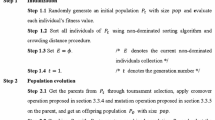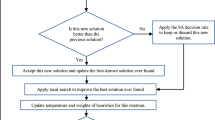Abstract
We address a proactive scheduling problem with stochastic machine breakdown, controllable processing time and deterioration effect considerations arising from steel production. The problem is to determine the pre-compression amount of each job’s processing time and the job sequence for the rolling process so as to achieve a robust predictive schedule in response to machine breakdown. Both robustness and stability of the predictive schedule are considered, in correspondence with the mean and variance of rescheduling cost that consists of match-up time cost and additional resource cost. Since the scenario-based approach to robustness evaluation of a predictive schedule is cursed with high computational burden, a surrogate-assisted multi-objective evolutionary algorithm based on Elitist non-dominated sorting genetic algorithm is proposed to solve the proactive scheduling problem under consideration. Support vector regression model is introduced to approximate the robustness of the each alternative schedule which surrogates the time-consuming simulation-based fitness evaluation process and saves more time for solution space search. In addition, a probabilistic sequencing strategy which takes advantage of each job’s ability to absorb disruption at low cost is introduced to guide the evolutionary search. Computational experiments of numerical and practical data indicate that the proposed proactive scheduling approach performs well in response to stochastic machine breakdown. The support vector regression model and the probabilistic sequencing strategy improve the performance of the proposed algorithm with respect to the convergence and diversity of the obtained Pareto front.






Similar content being viewed by others
References
Akturk MS, Atamturk A, Gurel S (2010) Parallel machine match-up scheduling with manufacturing cost considerations. J Sched 13:95–110
Aytug H, Lawley MA, McKay K, Mohan S, Uzsoy R (2005) Executing production schedules in the face of uncertainties: a review and some future directions. Eur J Oper Res 161:86–110
Briskorn D, Leung J, Pinedo M (2011) Robust scheduling on a single machine using time buffers. IIE Trans 43(6):383–398
Chaari T, Chaabane S, Loukil T, Trentesaux D (2011) A genetic algorithm for robust hybrid flow shop scheduling. Int J Comput Integr Manuf 24:821–833
Chang C, Lin C (2011) LIBSVM: a library for support vector machines. ACM Trans Intell Syst Technol 2:1–27
Cheng TCE, Ding Q, Lin BMT (2004) A concise survey of scheduling with time-dependent processing times. Eur J Oper Res 152:1–13
Deb K, Pratap A, Agarwal S, Meyarivan T (2002) A fast and elitist multiobjective genetic algorithm: NSGA-II. IEEE Trans Evolut Comput 6:182–197
Gonzalez MA, Vela CR, Varela R (2012) A competent memetic algorithm for complex scheduling. Nat Comput 11:151–160
Gordon VS, Potts CN, Strusevich VA, Whitehead JD (2008) Single machine scheduling models with deterioration and learning: handling precedence constraints via priority generation. J Sched 11:357–370
Goren S, Sabuncuoglu I (2008) Robustness and stability measures for scheduling: single-machine environment. IIE Trans 40:66–83
Goren S, Sabuncuoglu I (2010) Optimization of schedule robustness and stability under random machine breakdowns and processing time variability. IIE Trans 42:203–220
Graham R, Lawler E, Lenstra J, Rinnooy K (1979) Optimization and approximation in deterministic sequencing and scheduling: a survey. Ann Discrete Math 5:287–326
Gürel S, Aktürk MS (2007) Considering manufacturing cost and scheduling performance on a CNC turning machine. Eur J Oper Res 177:325–343
Gürel S, Cincioğlu D (2014) Rescheduling with controllable processing times for number of disrupted jobs and manufacturing cost objectives. Int J Prod Res 53(9):2751–2770
Gürel S, Korpeoglu E, Akturk MS (2010) An anticipative scheduling approach with controllable processing times. Comput Oper Res 37:1002–1013
Jin Y (2005) A comprehensive survey of fitness approximation in evolutionary computation. Soft Comput 9(1):3–12
Jin Y, Branke J (2005) Evolutionary optimization in uncertain environments—a survey. IEEE Trans Evol Comput 9(3):303–317
Jose Palacios J, Gonzalez-Rodriguez I, Vela CR, Puente J (2014) Robust swarm optimisation for fuzzy open shop scheduling. Nat Comput 13:145–156
Karimi H, Rahmati SHA, Zandieh M (2012) An efficient knowledge-based algorithm for the flexible job shop scheduling problem. Knowl Based Syst 36:236–244
Leung JYT, Ng CT, Cheng TCE (2008) Minimizing sum of completion times for batch scheduling of jobs with deteriorating processing times. Eur J Oper Res 187(3):1090–1099
Lim D, Jin YC, Ong YS, Sendhoff B (2010) Generalizing surrogate-assisted evolutionary computation. IEEE Trans Evolut Comput 14:329–355
Liu L, Zhou H (2014) Single-machine rescheduling with deterioration and learning effects against the maximum sequence disruption. Int J Syst Sci. doi:10.1080/00207721.2013.876519
Liu L, Gu HY, Xi YG (2007) Robust and stable scheduling of a single machine with random machine breakdowns. Int J Adv Manuf Technol 31:645–654
Liu F, Wang JJ, Yang DL (2013) Solving single machine scheduling under disruption with discounted costs by quantum-inspired hybrid heuristics. J Manuf Syst 32:715–723
Lu CC, Lin SW, Ying KC (2012) Robust scheduling on a single machine to minimize total flow time. Comput Oper Res 39(7):1682–1691
Lu Z, Cui W, Han X (2015) Integrated production and preventive maintenance scheduling for a single machine with failure uncertainty. Comput Ind Eng 80:236–244
Mao K, Pan Q, Pang X, Chai T (2014) An effective Lagrangian relaxation approach for rescheduling a steelmaking-continuous casting process. Control Eng Pract 30:67–77
Mencia R, Sierra MR, Mencia C, Varela R (2014) A genetic algorithm for job-shop scheduling with operators enhanced by weak Lamarckian evolution and search space narrowing. Nat Comput 13:179–192
Ong Y, Nair PB, Lum KY (2006) Max–min surrogate-assisted evolutionary algorithm for robust design. IEEE Trans Evolut Comput 10:392–404
Ouelhadj D, Petrovic S (2009) A survey of dynamic scheduling in manufacturing systems. J Sched 12:417–431
Paenke I, Branke J, Jin Y (2006) Efficient search for robust solutions by means of evolutionary algorithms and fitness approximation. IEEE Trans Evolut Comput 10(4):405–420
Sabuncuoglu I, Goren S (2009) Hedging production schedules against uncertainty in manufacturing environment with a review of robustness and stability research. Int J Comput Integr Manuf 22:138–157
Shabtay D, Steiner G (2007) A survey of scheduling with controllable processing times. Discrete Appl Math 155(13):1643–1666
Sun X, Gong D, Jin Y, Chen S (2013) A new surrogate-assisted interactive genetic algorithm with weighted semisupervised learning. IEEE T Cybern 43:685–698
Tang L, Liu P (2009) Flowshop scheduling problems with transportation or deterioration between the batching and single machines. Comput Ind Eng 56:1289–1295
Tang L, Liu J, Rong A, Yang Z (2000) A mathematical programming model for scheduling steelmaking-continuous casting production. Eur J Oper Res 120:423–435
Tang L, Liu J, Rong A, Yang Z (2001) A review of planning and scheduling systems and methods for integrated steel production. Eur J Oper Res 133:1–20
Tang L, Zhao Y, Liu J (2014) An improved differential evolution algorithm for practical dynamic scheduling in steelmaking-continuous casting production. IEEE Trans Evolut Comput 18:209–225
Vapnik V (1995) The nature of statistical learning theory. Springer, New York
Wang L (2005) A hybrid genetic algorithm–neural network strategy for simulation optimization. Appl Math Comput 170:1329–1343
Wang DJ, Liu F, Wang JJ, Wang YZ (2015) Integrated rescheduling and preventive maintenance for arrival of new jobs through evolutionary multi-objective optimization. Soft Comput. doi:10.1007/s00500-015-1615-7
Worapradya K, Thanakijkasem P (2015) Proactive scheduling for steelmaking-continuous casting plant with uncertain machine breakdown using distribution-based robustness and decomposed artificial neural network. Asia Pac J Oper Res 32:1550010
Xing L, Chen Y, Wang P, Zhao Q, Xiong J (2010) A knowledge-based ant colony optimization for flexible job shop scheduling problems. Appl Soft Comput 10:888–896
Yedidsion L, Shabtay D, Kaspi M (2007) A bicriteria approach to minimize maximal lateness and resource consumption for scheduling a single machine. J Sched 10(6):341–352
Yin Y, Liu M, Hao J, Zhou M (2012) Single machine scheduling with job position-dependent learning and time-dependent deterioration. IEEE Trans Syst Man Cybern A Syst Hum 42:192–200
Yin Y, Wu W, Cheng TCE, Wu C (2014) Due-date assignment and single-machine scheduling with generalised position-dependent deteriorating jobs and deteriorating multi-maintenance activities. Int J Prod Res 52(8):2311–2326
Zhao CL, Tang HY (2010) Rescheduling problems with deteriorating jobs under disruptions. Appl Math Model 34(1):238–243
Zhou AM, Zhang QF, Jin YC (2009) Approximating the set of pareto-optimal solutions in both the decision and objective spaces by an estimation of distribution algorithm. IEEE Trans Evolut Comput 13:1167–1189
Zitzler E, Thiele L (1998) Multiobjective optimization using evolutionary algorithms—a comparative case study. In: Eiben AE et al (eds) Proceedings of the 5th international conference on parallel problem solving from nature—PPSN V, vol 1498 of Lecture notes in computer science. Springer, Berlin, pp 292–301
Acknowledgements
This work has been supported by National Natural Science Foundation of China under Grant Nos (71420107028, 71501024, 71502026, 71533001), by Fundamental Research Funds for the Central Universities under Grant No (DUT15QY32), and by the China Postdoctoral Science Foundation (2016M590228).
Author information
Authors and Affiliations
Corresponding author
Rights and permissions
About this article
Cite this article
Wang, DJ., Liu, F. & Jin, Y. A proactive scheduling approach to steel rolling process with stochastic machine breakdown. Nat Comput 18, 679–694 (2019). https://doi.org/10.1007/s11047-016-9599-5
Published:
Issue Date:
DOI: https://doi.org/10.1007/s11047-016-9599-5




